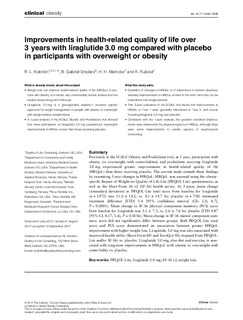| dc.contributor.author | Kolotkin, Ronette L. | |
| dc.contributor.author | Gabriel Smolarz, B | |
| dc.contributor.author | Meincke, H. H. | |
| dc.contributor.author | Fujioka, K | |
| dc.date.accessioned | 2019-03-28T08:54:34Z | |
| dc.date.available | 2019-03-28T08:54:34Z | |
| dc.date.created | 2017-10-23T13:32:16Z | |
| dc.date.issued | 2017 | |
| dc.identifier.citation | Kolotkin, R. L., Gabriel Smolarz, B., Meincke, H. H. & Fujioka, K. (2018). Improvements in health-related quality of life over 3 years with liraglutide 3.0 mg compared with placebo in participants with overweight or obesity. Clinical Obesity, 8(1), 1-10. | nb_NO |
| dc.identifier.issn | 1758-8111 | |
| dc.identifier.uri | http://hdl.handle.net/11250/2592093 | |
| dc.description.abstract | Previously in the SCALE Obesity and Prediabetes trial, at 1 year, participants with obesity (or overweight with comorbidities) and prediabetes receiving liraglutide 3.0 mg experienced greater improvements in health‐related quality of life (HRQoL) than those receiving placebo. The current study extends these findings by examining 3‐year changes in HRQoL. HRQoL was assessed using the obesity‐specific Impact of Weight on Quality of Life‐Lite (IWQOL‐Lite) questionnaire, as well as the Short‐Form 36 v2 (SF‐36) health survey. At 3 years, mean change (±standard deviation) in IWQOL‐Lite total score from baseline for liraglutide (n = 1472) was 11.0 ± 14.2, vs. 8.1 ± 14.7 for placebo (n = 738) (estimated treatment difference [ETD] 3.4 [95% confidence interval (CI): 2.0, 4.7], P < 0.0001). Mean change in SF‐36 physical component summary (PCS) score from baseline for liraglutide was 3.1 ± 7.3, vs. 2.6 ± 7.6 for placebo (ETD 0.87 [95% CI: 0.17, 1.6], P = 0.0156). Mean change in SF‐36 mental component summary score did not significantly differ between groups. Both IWQOL‐Lite total score and PCS score demonstrated an association between greater HRQoL improvement with higher weight loss. Liraglutide 3.0 mg was also associated with improved health utility (Short‐Form‐6D and EuroQol‐5D, mapped from IWQOL‐Lite and/or SF‐36) vs. placebo. Liraglutide 3.0 mg, plus diet and exercise, is associated with long‐term improvements in HRQoL with obesity or overweight with comorbidity vs. placebo. | nb_NO |
| dc.language.iso | eng | nb_NO |
| dc.publisher | Wiley | nb_NO |
| dc.rights | Attribution-NonCommercial-NoDerivatives 4.0 Internasjonal | * |
| dc.rights.uri | http://creativecommons.org/licenses/by-nc-nd/4.0/deed.no | * |
| dc.subject | IWQOL-Lite | nb_NO |
| dc.subject | liraglutide 3.0 mg | nb_NO |
| dc.subject | SF-36 v2 | nb_NO |
| dc.subject | weight loss | nb_NO |
| dc.title | Improvements in health-related quality of life over 3 years with liraglutide 3.0 mg compared with placebo in participants with overweight or obesity | nb_NO |
| dc.type | Journal article | nb_NO |
| dc.type | Peer reviewed | nb_NO |
| dc.description.version | publishedVersion | nb_NO |
| dc.rights.holder | © 2017 The Authors | nb_NO |
| dc.subject.nsi | VDP::Medisinske Fag: 700::Helsefag: 800 | nb_NO |
| dc.source.volume | 8 | nb_NO |
| dc.source.journal | Clinical Obesity | nb_NO |
| dc.source.issue | 1 | nb_NO |
| dc.identifier.doi | 10.1111/cob.12226 | |
| dc.identifier.cristin | 1506842 | |
| cristin.unitcode | 203,5,1,0 | |
| cristin.unitname | Avdeling for helsefag - Sogn og Fjordane | |
| cristin.ispublished | true | |
| cristin.fulltext | original | |
| cristin.qualitycode | 1 | |

